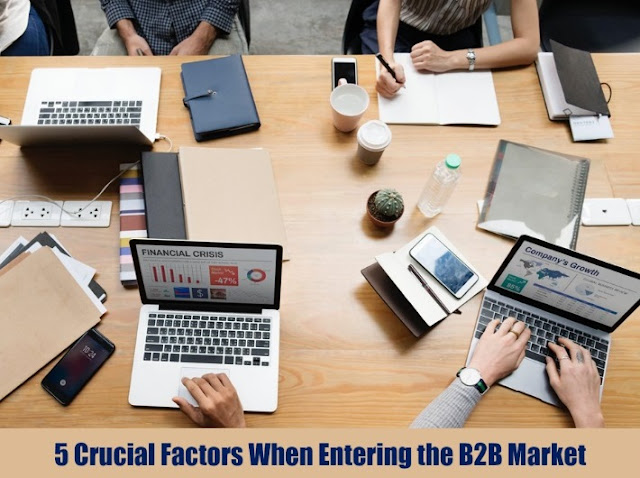5 Crucial Factors When Entering the B2B Market
Many customer-facing companies see the business-to-business market as an attractive prospect. Not only is the B2B market worth trillions of dollars, but deals tend to be worth more and relationships last longer. This means the return on investment can be quite high. While the B2B market is a lucrative one, there are a number of things B2C companies need to know before making the transition. It should not be assumed that you can just replicate what you’ve always done and achieve success. Here are 5 things you should keep in mind.


5 Crucial Factors When Entering the B2B Market
1. Your Marketing Needs to be Different:
B2B marketing relies on the same basic ideas as consumer marketing but there are key differences. This is because individual consumers are different from business buyers. Individuals choose to purchase an item based on factors like how popular it is, how it will make others perceive them, and how it will make them feel to have it. Price is only one of the factors they consider. Individuals are often reckless with their spending, purchasing on the basis of emotions rather than logic. However, it would be foolish for a business to operate in this way.
Those who make purchasing decisions for a company are concerned almost solely with price and return on the investment. They focus on needs and not wants. This has implications for the way you will market your products or services. Instead of trying to make your target audience feel something, you have to appeal to logic. Focus on quality and cost savings or revenue generation. B2B customers are more likely to spend larger sums but you have to convince them that it’s worth it.
Another thing you need to consider is how you will reach your target audience. When you’re trying to reach a mass audience of consumers, your messaging will be less specific and you can include radio and television in your advertising efforts. When you’re marketing your product to a narrow niche of buyers, you will need to do different things. Consider attending industry events and networking with purchasers or hosting informational sessions. You can also establish your company as an expert in your field by sending out email newsletters or posting relevant content on your website and social media channels.
2. Lots of People Are Involved in the Buying Process:
When you’re marketing to consumers, the buying decision is usually up to one person or a couple members of a family. However, the buying process is far more complicated when you’re dealing with the B2B segment. Companies usually have several departments and individuals involved. The bigger the investment and the larger the organization, the more layers of bureaucracy there will be. This is understandable since companies stand to lose a lot if they make a bad decision. They may even lose customers.


This means even if you manage to convince one person to recommend your product or service, they will still need to get approval from someone higher up. The time between expressing interest and making a purchase can, therefore, be much longer.
3. B2B Products Can be More Complex:
Many consumer products are pretty simple to understand. Even if they are not, most people aren’t interested in how they work. However, industrial products may be custom-made and designed according to certain requirements. This means the buyer has extensive knowledge of how the product has to be made. The technical details matter to them. You, therefore, need to engage them on a completely different level.
4. B2B Relationships Are Usually Long-Term:
Individual consumers tend to switch brands easily, but businesses look to form long-term relationships. There are a couple of reasons for this. Firstly, it can take a long time and a lot of money to find new B2B partners. Companies tend to stick with the same supplier for a long time. They seek to build a rapport with the retailer’s representatives so they can have their needs met for years to come. It is, therefore, important that you are able to build trust and maintain the relationship. You will need to work very closely with your B2B customers, so you understand their needs, preferences, and objectives. You should even be able to predict what they will need next.


Secondly, businesses often purchase products for which they will need long-term after-sales support. They may buy a fleet of vehicles or software for deployment on hundreds of machines. They will likely need more advice and ongoing assistance than an individual who buys a product for their sole use.
On your part, you should remember that while there are lots of individuals looking to make purchases, there are fewer business customers. Each B2B customer is valuable and you should treat them as such. If you lose one big customer, the effect can be catastrophic.
5. B2B Buyers Tend to be More Demanding:
There’s a lot of responsibility on the shoulders of a business-to-business buyer. They need to make the right decision when they buy products and services on behalf of their companies. They are therefore less likely to take risks. Expect them to ask more questions and demand more accountability. They may even require you to have certain e-procurement systems in place like PunchOut Catalogs. An individual would never ask for something like that. However, business customers are paying more, and they will be around for the long term. They, therefore, expect more in return.
If you’re considering taking the leap from B2C to B2B, keep these tips in mind. This market can be quite lucrative once your business is up to standard and you understand the nuances involved.







No comments